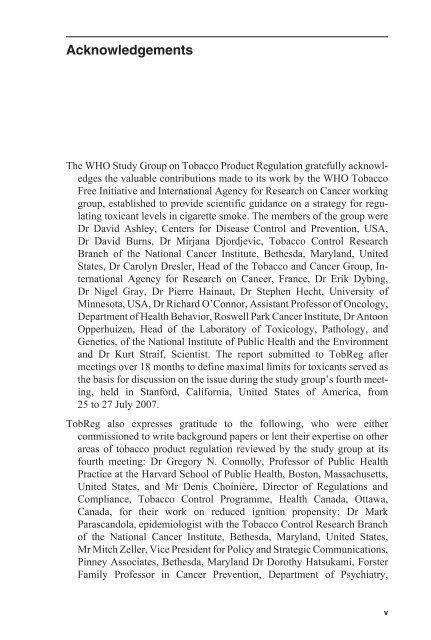The Scientific Basis of Tobacco Product Regulation - World Health ...
The Scientific Basis of Tobacco Product Regulation - World Health ...
The Scientific Basis of Tobacco Product Regulation - World Health ...
Create successful ePaper yourself
Turn your PDF publications into a flip-book with our unique Google optimized e-Paper software.
Acknowledgements<br />
<strong>The</strong> WHO Study Group on <strong>Tobacco</strong> <strong>Product</strong> <strong>Regulation</strong> gratefully acknowledges<br />
the valuable contributions made to its work by the WHO <strong>Tobacco</strong><br />
Free Initiative and International Agency for Research on Cancer working<br />
group, established to provide scientific guidance on a strategy for regulating<br />
toxicant levels in cigarette smoke. <strong>The</strong> members <strong>of</strong> the group were<br />
Dr David Ashley, Centers for Disease Control and Prevention, USA,<br />
Dr David Burns, Dr Mirjana Djordjevic, <strong>Tobacco</strong> Control Research<br />
Branch <strong>of</strong> the National Cancer Institute, Bethesda, Maryland, United<br />
States, Dr Carolyn Dresler, Head <strong>of</strong> the <strong>Tobacco</strong> and Cancer Group, International<br />
Agency for Research on Cancer, France, Dr Erik Dybing,<br />
Dr Nigel Gray, Dr Pierre Hainaut, Dr Stephen Hecht, University <strong>of</strong><br />
Minnesota, USA, Dr Richard O’Connor, Assistant Pr<strong>of</strong>essor <strong>of</strong> Oncology,<br />
Department <strong>of</strong> <strong>Health</strong> Behavior, Roswell Park Cancer Institute, Dr Antoon<br />
Opperhuizen, Head <strong>of</strong> the Laboratory <strong>of</strong> Toxicology, Pathology, and<br />
Genetics, <strong>of</strong> the National Institute <strong>of</strong> Public <strong>Health</strong> and the Environment<br />
and Dr Kurt Straif, Scientist. <strong>The</strong> report submitted to TobReg after<br />
meetings over 18 months to define maximal limits for toxicants served as<br />
the basis for discussion on the issue during the study group’s fourth meeting,<br />
held in Stanford, California, United States <strong>of</strong> America, from<br />
25 to 27 July 2007.<br />
TobReg also expresses gratitude to the following, who were either<br />
commissioned to write background papers or lent their expertise on other<br />
areas <strong>of</strong> tobacco product regulation reviewed by the study group at its<br />
fourth meeting: Dr Gregory N. Connolly, Pr<strong>of</strong>essor <strong>of</strong> Public <strong>Health</strong><br />
Practice at the Harvard School <strong>of</strong> Public <strong>Health</strong>, Boston, Massachusetts,<br />
United States, and Mr Denis Choinière, Director <strong>of</strong> <strong>Regulation</strong>s and<br />
Compliance, <strong>Tobacco</strong> Control Programme, <strong>Health</strong> Canada, Ottawa,<br />
Canada, for their work on reduced ignition propensity; Dr Mark<br />
Parascandola, epidemiologist with the <strong>Tobacco</strong> Control Research Branch<br />
<strong>of</strong> the National Cancer Institute, Bethesda, Maryland, United States,<br />
Mr Mitch Zeller, Vice President for Policy and Strategic Communications,<br />
Pinney Associates, Bethesda, Maryland Dr Dorothy Hatsukami, Forster<br />
Family Pr<strong>of</strong>essor in Cancer Prevention, Department <strong>of</strong> Psychiatry,<br />
v

















